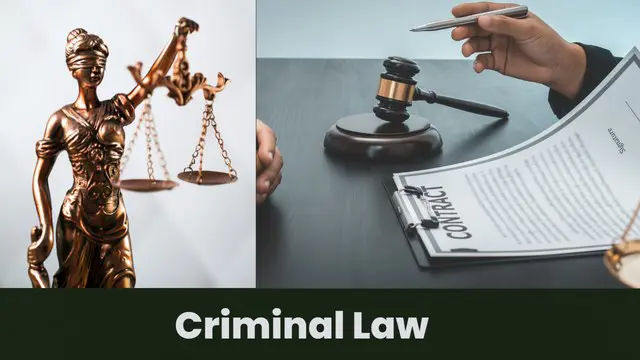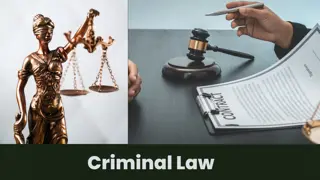
Criminal Law Training
CPD Certified| Free PDF Certificate | Lifetime Access | Learner Support | No Hidden Fees | 100% Success Rate
EDURISE
Summary
- Certificate of completion - Free
- Reed courses certificate of completion - Free
- Tutor is available to students
Add to basket or enquire
Overview
Unlock the Intricacies of Criminal Law with Our Comprehensive Training
Are you fascinated by the world of criminal justice and the legal system? Do you have a deep curiosity about how criminal cases are investigated, prosecuted, and defended? Our "Criminal Law Training" course offers a deep dive into the captivating realm of criminal law without the need for practical training or certificates.
Why Criminal Law Matters:
Criminal law is the backbone of a just society. It defines the boundaries of acceptable behavior and sets the rules for punishment when those boundaries are breached. Understanding criminal law is not just for aspiring lawyers; it's essential for anyone interested in the complexities of our legal system, whether for personal knowledge or business acumen.
Data-Driven Insights:
The demand for knowledge in criminal law is evergreen. It's not just about knowing what's right and wrong; it's about grasping the intricacies of the law, legal procedures, and the rights of individuals within the system. This course is designed to provide valuable data-driven insights into the world of criminal law, catering to various interests:
1. Legal Enthusiasts: If you're passionate about the law and love to engage in discussions about criminal cases, this course offers you the foundation to explore the legal intricacies more deeply.
2. Business Professionals: Understanding criminal law can be a valuable asset in various fields, such as compliance, risk management, and corporate governance.
3. Students and Academics: Whether you're a student in law, criminal justice, or a related field, this course supplements your academic knowledge and provides practical insights.
4. Citizens Concerned About Rights: For individuals who want to be informed about their legal rights and the criminal justice system's workings, this course is an invaluable resource.
5. Curiosity-Driven Learners: If you're simply curious about how criminal law functions and want to expand your horizons, this course satisfies your intellectual curiosity.
Course Highlights:
Criminal Law Fundamentals: Gain a solid understanding of criminal law principles, including legal definitions, elements of crimes, and the burden of proof.
Criminal Procedure: Delve into the processes involved in investigating, prosecuting, and defending criminal cases.
Legal Rights: Explore the constitutional rights of individuals, including the right to remain silent, the right to legal representation, and protection against unreasonable searches and seizures.
Real-Life Case Studies: Analyze famous criminal cases and legal precedents to understand how the law is applied in practice.
Ethical Considerations: Examine the ethical dilemmas that can arise in criminal law, providing a well-rounded perspective on the subject.
Your Journey Starts Here:
Embark on a journey through the intricate corridors of criminal law with our comprehensive online course. Gain insights, broaden your knowledge, and discover the inner workings of the legal system. Enroll today and take your understanding of criminal law to new heights.
Free Gift
- Course Completion PDF Certificate
- Tutor Support
- Free Session with professionals
Curriculum
Course media
Description
Learning Outcomes:
Module 1: Introduction to Criminal Law
- Outcome 1: Understand the foundational concepts of criminal law, including its purpose and role in society.
- Outcome 2: Identify the key differences between civil and criminal law and their respective applications.
- Outcome 3: Explain the sources of criminal law and the hierarchy of legal principles.
Module 2: Elements of a Crime
- Outcome 1: Define the essential elements of a crime, including actus reus and mens rea.
- Outcome 2: Analyze how criminal liability is established through the presence of these elements.
- Outcome 3: Recognize the significance of causation and concurrence in criminal law.
Module 3: The Police
- Outcome 1: Explore the role of law enforcement agencies in criminal investigations and public safety.
- Outcome 2: Understand the powers and limitations of the police, including search and seizure procedures.
- Outcome 3: Discuss the importance of police ethics and accountability in the criminal justice system.
Module 4: Prosecution, Caution, and Diversion
- Outcome 1: Examine the process of prosecution, from the decision to charge to the trial phase.
- Outcome 2: Understand alternative measures such as cautioning and diversion, and their impact on offenders.
- Outcome 3: Evaluate the goals of the prosecution, including deterrence, rehabilitation, and public protection.
Module 5: The Trial
- Outcome 1: Analyze the components of a criminal trial, including the roles of judges, juries, and legal representation.
- Outcome 2: Explore trial procedures, including the presentation of evidence, witness examination, and cross-examination.
- Outcome 3: Discuss the principles of fairness, impartiality, and the burden of proof in a criminal trial.
Module 6: Sentencing Process
- Outcome 1: Examine the sentencing options available to the courts, such as imprisonment, fines, probation, and community service.
- Outcome 2: Understand the factors that influence sentencing decisions, including the seriousness of the offense and the offender's circumstances.
- Outcome 3: Evaluate the goals of sentencing, including deterrence, rehabilitation, and restorative justice.
Module 7: Homicide
- Outcome 1: Define the different forms of homicide, including murder, manslaughter, and infanticide.
- Outcome 2: Explore the legal elements and defenses associated with homicide cases.
- Outcome 3: Analyze real-world homicide cases to understand their legal complexities and outcomes.
Certificate of Completion
After completing the Criminal Law diploma course, you will be able to obtain your free PDF certificate of course completion.
Who is this course for?
Appropriate Traffic/Ideal Audience:
Law Students: Law students, particularly those specializing in criminal law, can benefit from this course as it provides a comprehensive understanding of the fundamentals of criminal law, the criminal justice system, and legal procedures related to crime and punishment.
Aspiring Legal Professionals: Individuals aspiring to pursue a career in the legal field, including future lawyers, paralegals, and legal assistants, can gain valuable insights into criminal law, which is a significant component of the legal profession.
Law Enforcement Personnel: Police officers, detectives, and law enforcement personnel seeking a deeper understanding of criminal law principles and procedures, as well as the limitations of police powers, can find this course relevant to their career development.
Criminal Justice Professionals: Professionals working within the criminal justice system, such as probation officers, correctional officers, and court personnel, can enhance their knowledge of the legal aspects of their roles and responsibilities.
Criminal Justice Educators: Instructors and educators teaching criminal justice or related courses can use this course as a resource to supplement their curriculum and provide students with a structured overview of criminal law.
Legal Enthusiasts: Individuals with a general interest in the legal system and criminal justice, even if not pursuing a formal legal career, can enroll in this course to gain a deeper understanding of how criminal law works and its impact on society.
Pre-Law Students: Students considering a future in law who want to explore the basics of criminal law before formal legal studies may find this course helpful in making informed career decisions.
Parents and Guardians: Those interested in educating themselves about criminal law and its implications in various legal scenarios, including issues affecting family and children, can find this course informative.
Community Advocates: Community leaders, activists, and advocates working on issues related to criminal justice reform and civil rights may find this course valuable for understanding the legal framework and advocating for change.
General Public: Anyone interested in understanding the core principles of criminal law, their rights and responsibilities as citizens, and the functioning of the criminal justice system can enroll in this course to gain knowledge that can be applied in everyday life.
Requirements
The Criminal Law course has no formal entry requirements. However, to study the Criminal Law course students must:
Have passion for virtual learning
Have a good understanding of English, as well as numeracy and IT skills
Have a desire for Criminal Law topic
Career path
- Legal Trainee: Entry-level position during legal training, salary varies.
- Criminal Defense Solicitor or Prosecutor: After qualification and experience, salaries can range from £30,000 - £60,000 per year in the UK.
- Senior Criminal Barrister: Experienced barristers may earn £60,000 - £100,000 or more annually, depending on their expertise and caseload.
Questions and answers
Currently there are no Q&As for this course. Be the first to ask a question.
Certificates
Certificate of completion
Digital certificate - Included
Reed courses certificate of completion
Digital certificate - Included
Will be downloadable when all lectures have been completed
Reviews
Currently there are no reviews for this course. Be the first to leave a review.
Legal information
This course is advertised on reed.co.uk by the Course Provider, whose terms and conditions apply. Purchases are made directly from the Course Provider, and as such, content and materials are supplied by the Course Provider directly. Reed is acting as agent and not reseller in relation to this course. Reed's only responsibility is to facilitate your payment for the course. It is your responsibility to review and agree to the Course Provider's terms and conditions and satisfy yourself as to the suitability of the course you intend to purchase. Reed will not have any responsibility for the content of the course and/or associated materials.


